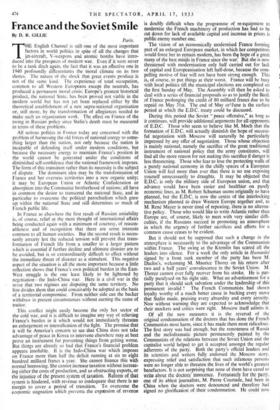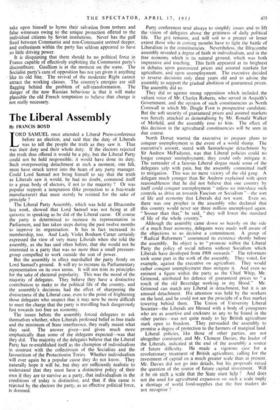France and the Soviet Smile
By D. R. GILLIE
- Paris.
All serious politics in France today are concerned with the problem of harnessing the old forces of national energy to some- thing larger than the nation, not only because the nation is incapable of defending itself under modern conditions, but because the necessary energy to maintain -France's position in the world cannot be generated under the conditions of diminished self-confidence that the national framework imposes. The form of this transition rather than its necessity is the subject of dispute. The dominant idea may be the transformation of France and her overseas territories into a new organic unity; it may be European Union or Atlantic Confederation or absorption into the Communist brotherhood of nations; all have in common the desire to transcend the national State, and in particular to overcome the political parochialism which grew up within the national State and still determines so much of French public life.
In France as elsewhere the first result of Russian amiability is, of course, relief at the mere thought of international affairs being conducted again with a minimum of courtesy, of reason- ableness and of recognition that there are some interests common to all human societies. But the second result is neces- sarily anxiety lest the reduced tension will prevent that trans- formation of French life from a smaller to a larger pattern which is essential if further decline and ultimate disaster are to be avoided, but is so extraordinarily difficult to effect without the immediate threat of disaster as a stimulant. This negative aspect of the situation is all the more important because a little reflection shows that France's own political burden in the East- West struggle is the one least likely to be lightened by negotiation—the Indo-China war. Here is a civil war in the sense that two regimes are disputing the same territory. No line divides them that could conceivably be adopted as the basis of a territorial compromise. From neither side can the backer withdraw in present circumstances without earning the name of traitor.
This conflict might easily become the only hot sector of the cold war, and it is difficult to imagine any way of relieving France's burden in it which would not immediately threaten an enlargement or intensification of the fight. The promise that it will be America's concern to see .that China does not take advantage of peace in Korea to intervene elsewhere may at best prove an instrument for preventing things from getting worse. But things are already so bad that France's financial problem appears insoluble. It is the Indo-China war which imposes on France more than half the deficit running at six to eight hundred milliard francs a year. She cannot finance this with normal borrowing. She cannot increase taxation without increas- ing either the costs of production, and so obstructing exports, or the injustice of the present system of .taxation. Reform of that system is hindered, with revenue so inadequate that there is no margin to cover a period of transition. To overcome the economic stagnation which prevents the expansion of revenue is doubly difficult when the programme of re-equipment to modernise the French machinery of production has had to be cut down for lack of available capital and increase in prices is public enemy number one.
The vision of an economically modernised France forming part of an enlarged European market, in which her competitors would force her to remain modern, has been thy hope of a great many of the best minds in France since the war: But she is now threatened with modernisation only half carried out for lack of capital and Europeanisation left half-done, because the com- pelling motive of fear will not have been strong enough. This is, of course, to put things at their worst. France will be busy with local politics till the Municipal elections are completed on the first Sunday of May. The Assembly will then be asked to deal with a series of financial proposals so as to justify the Bank of France prolonging the credit of 80 milliard francs due to be repaid on May 31st. The end of May ortiune is the earliest period at which the E.D.C. treaty could be discussed.
During this period the Soviet " peace offensive," as long as it continues, will provide additional arguments for all opponents of E.D.C. Those who seem to believe like M. Moch that the formation of E.D.C. will actually diminish the hope of success- ful negotiation with Moscow will naturally be particularly impressed by any offer of negotiation. Those whose objection is mainly national, namely the sacrifice of `the great traditional instrument of national policy that the army constitutes, will find all the more reason for not making this sacrifice if danger is less threatening. Those who fear to lose the protecting walls of a purely national- economy in the chilly spaces of a European Union will feel more than ever that there is no use exposing yourself unnecessarily to draughts. It may be objected that E.D.C. is only the Military side of European union, and that advance would have been easier and healthier on purely economic lines, as M. Robert Schuman seems originally to have planned, but the E.D.C. is now the centre of the interlocking mechanism planned to draw Western Europe together and, as M. Rene Mayer is never tired of repeating, there is no alterna- tive policy. Those who would like to write Atlantic rather than Europe are, of course, likely to meet with very similar diffi- culties, if the Russians succeed in promoting an atmosphere in which the urgency of further sacrifices and efforts for a common cause ceases to be evident.
But it should not be supposed that such a change in the atmosphere is necessarily to the advantage of the Communists within France. The swing at the Kremlin has scared all the leaders into silence. For a week the only article in Humanite signed by a front rank member of the party has been M. Duclos's, welcoming M. Maurice Thorez on his return after two and a half years' convalescence in the Soviet Union. M. Thorez cannot ever_ fully recover from his stroke. He is par- tially paralysed on his right side. What an advertisement for a party that it should seek salvation under the leadership of this permanent invalid ! The French Communists had shown loyalty worthy of a much better cause in backing every move that Stalin made, praising every absurdity and every atrocity. Now without warning they are expected to acknowledge that their mockers and critics were right. Moscow itself admits it.
Of all the new measures it is the reversal of the original condemnation of the doctors that has, done the French Communists most harm, since it has made them most ridiculous. The first story was bad enough, but the remoteness of Russia and the melodramatic picture permanently painted by the Communists of the relations between the Soviet. Union and the capitalist world helped to get it accepted amongst the regular adherents of the party. Both the party's official leaders and its scientists and writers fully endorsed the Moscow story, expressing relief and satisfaction that such infamous persons were no longer able to threaten the lives of the world's greatest benefactors. It is not surprising that none of them have cared to write about the doctors' innocence. Fortunately for the party, one of its ablest journalists, M. Pierre Courtade, had been in China when the doctors were denounced and therefore had signed no glorification of their condemnation. He could now take upon himself to hymn their salvation from torture and false witnesses owing to the unique protection offered to the individual citizens by Soviet institutions. Nevet has the gulf fixed between Communist and non-Communist seemed deeper, and enthusiasm within the party has seldom appeared to have so little driving power.
It is disquieting that there should be -no political force in France capable of effectively exploiting the Communist party's discomfiture. Gaullism is at the moment on the wane. The Socialist party's cure of opposition has not yet given it anything - like its old bite. The revival of the moderate Right cannot attract the working classes. 'The, country's energies are still flagging behind the problem of self-transformation. The danger of the new Russian behaviour is that it will make plausible the old French temptation to believe that change is not really necessary.



































 Previous page
Previous page